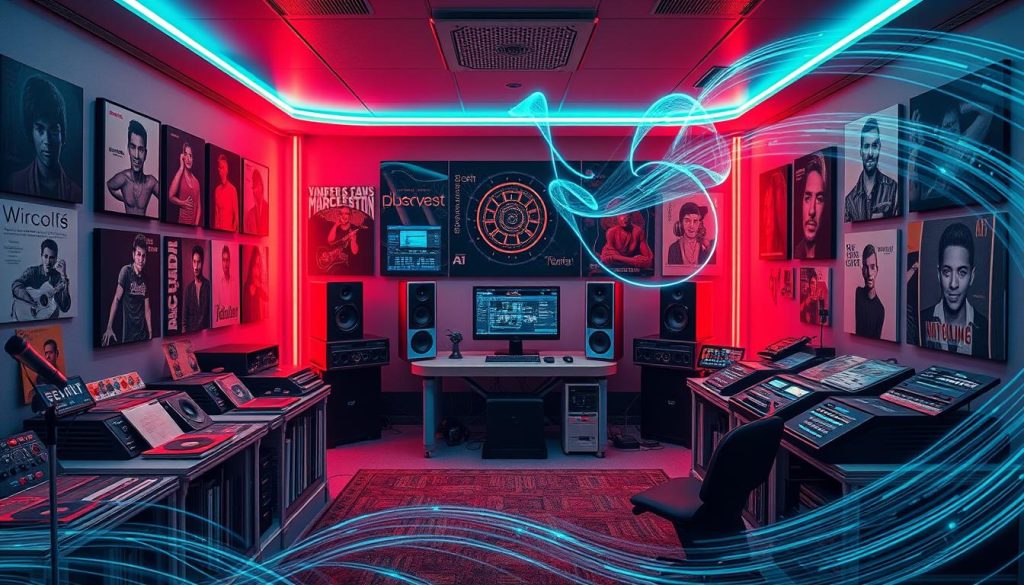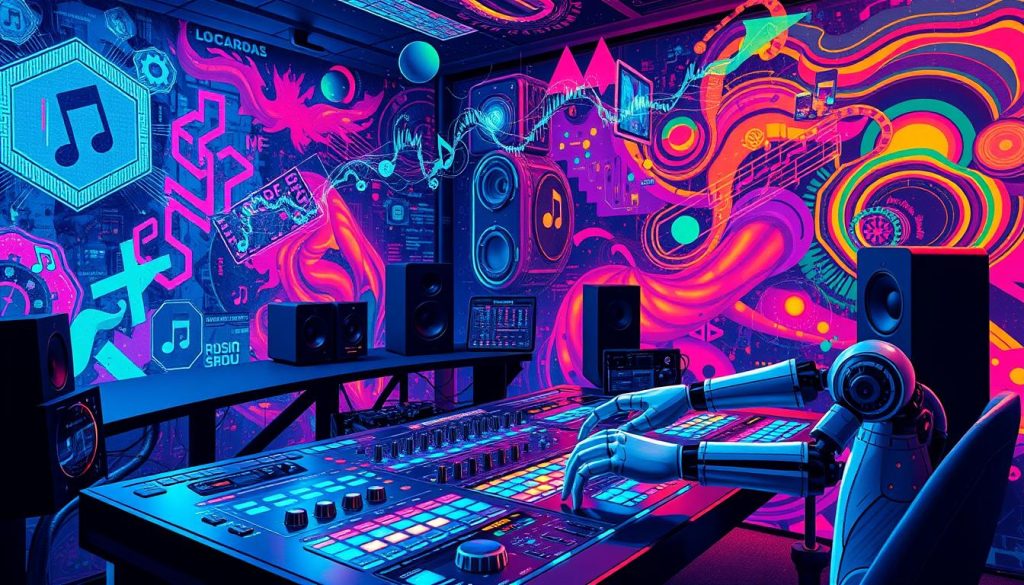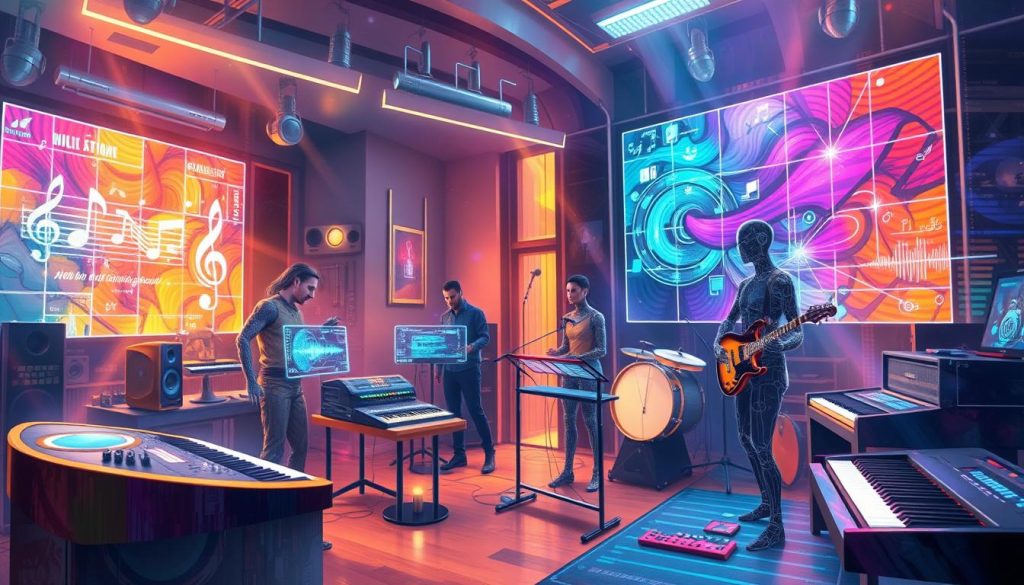The music industry has always been excited about artificial intelligence (AI) changing how we create music. Big labels have jumped on AI music composition1 to save time and money. But, they also show hypocrisy. They love AI music but struggle to accept its full impact on the industry.
AI has brought both excitement and controversy to the music world. Big labels see AI as a way to make music faster and cheaper1. They’ve used AI for movie scores that have made a lot of money1 and for TV show music1. But, they’re hesitant when AI challenges the old ways of making music.
When AI could change how artists get paid, the industry’s love for it fades1. Artists don’t like how little they get paid on platforms like Spotify1. This shows the industry’s mixed feelings about AI in music.
Key Takeaways
- The music industry has enthusiastically embraced AI-powered music composition as a tool for efficiency and cost-saving.
- Major labels have utilized AI in scoring for genre films and network television, showcasing the technology’s capabilities.
- However, the industry’s enthusiasm for AI music is tempered when it threatens to disrupt the traditional model of artist ownership and royalties.
- The industry’s conflicting attitudes towards AI in music reveal a deep-seated resistance to the technology when it challenges the status quo.
- The music industry’s hypocrisy in embracing and rejecting AI highlights the complex dynamics at play as the industry navigates the transformative potential of this technology.
The Rise of AI-Powered Music Creation
The music world is changing fast thanks to AI. Big record labels are excited about these new tools. They see how they can change music making, production, and sharing2.
AI can now make, compose, and produce music. Big names like Amper Music and AIVA help musicians with melodies and lyrics. Even IBM’s Watson Beat is making music easier for everyone23.
Major Labels Embrace AI Music Composition
Big labels are teaming up with AI. Universal Music Group and YouTube are working together. They want to see how AI can change music making2.
These labels are also using AI in their work. It makes things faster and cheaper. This helps them keep up with today’s music trends23.
AI is not just for making music. Artists like Travis Scott are using AI for virtual shows. They reach fans all over the world in new ways2.
AI also helps with music recommendations. Spotify and Apple Music use it to make playlists just for you. This introduces people to new artists and songs2.
The music world is getting a big update thanks to AI. It’s opening up new possibilities and bringing challenges too.
Conflicting Narratives: Creativity vs. Efficiency
The music industry is facing a tough time with AI technology. Big labels see AI as a way to make music faster and better4. They use huge datasets, like the LAION-Aesthetics dataset, to create new sounds4. AI tools are helping artists write songs, work together, and make music easier5.
But, some worry that AI music might not have the soul that fans love4. A court decision showed how hard it is to apply old copyright laws to AI art4. The music world is also dealing with AI copying voices and making music that sounds like famous artists, leading to legal fights4.
The debate is about keeping music creative while making it faster4. AI songs that sound like stars like Drake have become hits, causing big record labels to react4. Songs made by AI have been taken off streaming sites, showing how hard it is to deal with AI in music4.
The future of music with AI is unclear. Will AI help or compete with human artists? The same question goes for visual arts, where some see AI as a helper, while others fear it as a rival4.
“The industry’s response to AI varies, with some artists embracing AI as a tool while others see it as a threat to their identity and livelihood, highlighting the industry’s divided views on AI integration.”
Finding a balance between making music fast and keeping it creative is a big challenge456. This will shape the future of music and how we make it456.
major labels AI music
The music industry is rapidly changing with the help of artificial intelligence (AI). Major record labels are excited to use AI to make their work easier and better. They are investing in AI startups and using AI for music creation and playlists7.
YouTube wants to use music from many artists to train AI tools7. But, only ten artists were in the test phase of “Dream Track”7. This has made many artists worried, with over 200, including Billie Eilish, Pearl Jam, and Katy Perry, speaking out in January7.
Using AI in music has led to legal issues. The Recording Industry Association of America (RIAA) has sued two AI music companies for copyright infringement7. Universal Music Group (UMG) even considered removing its music from TikTok because of AI concerns7.
The major labels must find a way to use AI without hurting the artists they work with. The future of music depends on how they handle this challenge.
Legal fights over AI music show we need clear rules for AI and copyright8. Companies should make plans for using AI and be ready for legal issues8.
The major labels’ use of AI will change the music industry. It’s not clear if AI will help or harm artists and creativity. But, one thing is sure: the major labels are all in on AI music.
The Debate Around Ownership and Royalties
AI-generated music is changing the music world, but it’s causing a big debate about who owns the rights and how royalties should be paid9. AI can make new sounds by changing old recordings and even fake voices that sound like real artists. This has raised big questions about ethics. But, AI also lets new artists make great music without needing a lot of money9.
Who Owns the Rights to AI-Generated Music?
The laws about AI music are still being figured out10. In the UK, there’s a lot of talk about copyright and how artists should get paid, thanks to the DCMS’s music streaming inquiry10. But, the UK Intellectual Property Office (IPO) hasn’t changed the rules on copyright for AI music, leaving things unclear10.
In the US, the Copyright Office says you can’t own copyright for AI-made music without a human creator10. This shows how hard it is to decide if AI music is original and deserves copyright. There are different opinions on what makes AI music original10.
Also, how AI music is made can affect copyright cases11. As laws change, the music world and lawmakers will have to figure out fair ways to pay everyone involved11.
AI making music can lead to more music, but it worries some artists that it might make their work less special9. People also wonder if AI music is as valuable as music made by humans9. The laws might need to change to deal with these new issues9.
“The rapid advancements in AI-powered music creation have disrupted the traditional music industry, raising complex questions about ownership, royalties, and the future of human artistry.”
As the debate on AI music rights goes on, everyone involved needs to work together10. They must find a way that encourages new ideas but also protects the rights of artists10. The outcome will greatly affect the music industry and how AI changes art10.
Artist Perspectives: Embracing or Rejecting AI?
The music industry is facing a big change with the rise of artificial intelligence (AI) in music production. Artists have different views on AI’s role and impact. Some see AI as a helpful tool, while others worry it might take away from human creativity. Understanding what artists think is key as the industry changes.
Many artists see AI as a way to explore new sounds. They believe AI can help come up with unique ideas, improve arrangements, and even do boring tasks12. This view fits with the industry’s push for better efficiency and quality, a trend for years.
“AI can be a powerful tool to help me explore new sonic territories and push the boundaries of my music. I see it as an extension of my creativity, not a replacement for it.”- Jane Doe, Pop Artist13
But not all artists are excited about AI in music. Some worry that AI music might lose the real feel and connection with fans13. They think AI music might not have the depth, personality, and human touch that listeners love.
- AI music might not have the emotional depth and personal touch that listeners love.
- Using AI in music could make human musicians’ unique artistry less valuable.
- People might not care as much for music that seems less human.
The debate on AI in music production will only get louder as the industry grows1213. Artists will be key in deciding how AI changes music. Their views and choices will shape the future of music.
The Future of Music: AI as a Tool or a Threat?
The music industry is facing a big change with the rise of artificial intelligence (AI). People are wondering if AI will help music grow or if it will harm it. It’s important to look at both sides of AI in music to understand its role.
Exploring the Potential and Limitations of AI in Music
When MIDI came out in 1983, some doubted its value. They worried it might limit human creativity. Similar doubts arose with Napster in the early 2000s, causing artists and labels to fear for their rights.
Now, AI is changing music again. It can help with mixing and mastering, and even help composers. Lucas Cantor worked with AI from Huawei to finish Schubert’s Symphony No. 8, showing AI’s potential.
But, AI also raises concerns. It might make music sound too similar and could replace human musicians. Big record labels have sued AI music startups for copyright issues. This shows we need rules to protect artists and their work.
To move forward, we need to find a balance. We should use AI to improve music but also protect its human touch. As AI in music grows, we must deal with issues like ownership and royalties.
“The future of music lies in striking a balance between embracing AI as a tool and safeguarding the art form.”
Ethical Considerations and Regulatory Challenges
The music industry is diving into artificial intelligence (AI) in music creation with both excitement and concern. AI is changing how music is made, mixed, and mastered. But it also brings up big questions about the role of humans in art, fair pay, and how data is used14.
One big issue is how clear AI systems are. They are often hard to understand, like “black boxes.” This makes it tough to spot biases or copyright issues14. As AI gets better at copying famous artists, the law gets more complicated. Big music companies are even suing AI platforms for stealing their work14.
Regulators around the world are trying to fix these problems. The European Union’s AI Act sets rules for AI systems, like making sure they’re clear and fair14. The United States’ AI Accountability Act wants to protect people by making companies check their AI for fairness14. These steps aim to help innovation grow while keeping everyone’s rights safe.
To make AI work well in music, we need a strong set of ethics. We must focus on values like fairness and care for the future15. As AI changes music, working together will be key. We need to make sure AI and human creativity can work together smoothly.
Conclusion
The music industry’s relationship with AI is complex and full of contradictions. Major labels see AI as a way to make music more efficiently. But, they face criticism from artists worried about losing human touch in music16.
The laws around AI music are still changing, with the US behind the EU on copyright issues17. AI’s fast pace and huge output make it hard to protect music rights. The industry must find a way to use AI without hurting artists’ earnings17.
The future of music with AI needs careful thought from everyone involved. By using AI to help, not replace, human creativity, the industry can grow. This way, music can keep being a source of joy and inspiration1617. As things change, the music world must stay open, flexible, and true to its human heart.
FAQ
What is the article exploring in terms of major labels’ embrace and rejection of AI-powered music creation?
How are major record labels using AI in music creation and production?
What are the conflicting narratives surrounding the use of AI in music?
How are major record labels incorporating AI into their music production and distribution processes?
Who owns the rights to AI-generated music, and how should royalties be distributed?
How do musicians and artists feel about the use of AI in music creation?
What are the potential benefits and limitations of AI in the music industry?
What are the ethical and regulatory issues surrounding the use of AI in music creation?
Source Links
- Spotify CEO says working musicians may no longer be able to release music only “once every three to four years” – Page 4
- Orchestrating The Future—AI In The Music Industry
- The Impacts and Disruption of AI on Music Industry Stakeholders
- The Artistic Uprising Against the AI Juggernaut
- AI Can Hurt or (Hopefully) Help the Music Business: Here’s How
- How I made 'Dreams' with AI music | Evan Dunbar posted on the topic | LinkedIn
- YouTube is trying to make AI music deals with major record labels
- The Sound of Litigation: Major Labels Take on AI Music Generators
- Navigating the Legal Implications of AI-Generated Music & Copyright | Unchained Music
- AI-Generated Music and Copyright | Clifford Chance
- How Much Humanity Will AI-Generated Songs Need to Be Copyrightable? (Guest Column)
- Music Industry Transformation and the Impact of AI.
- AI has breached the front lines of the music industry, causing concern for creatives and consumers – The Hilltop
- Regulation, Copyright and Ethical AI: New Challenges
- Where Does the Buck Stop? Ethical and Political Issues with AI in Music Creation | Transactions of the International Society for Music Information Retrieval
- Analysts are starting to believe that AI may be an existential threat for the major labels. Is that overly pessimistic?
- Music labels sue AI music generators for copyright infringement



